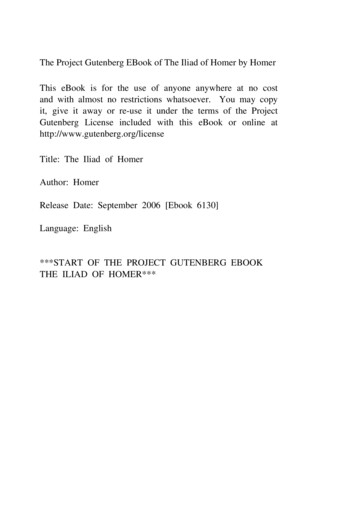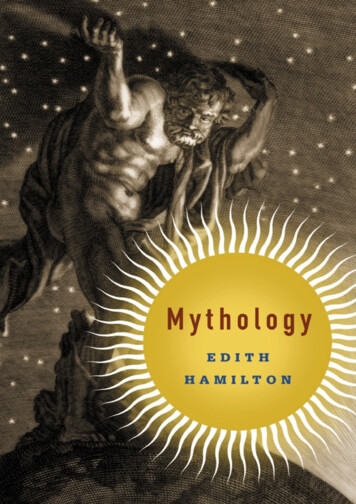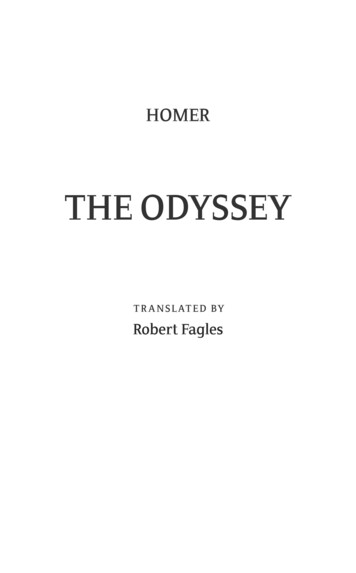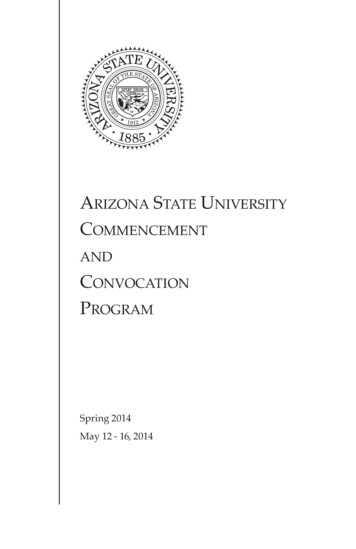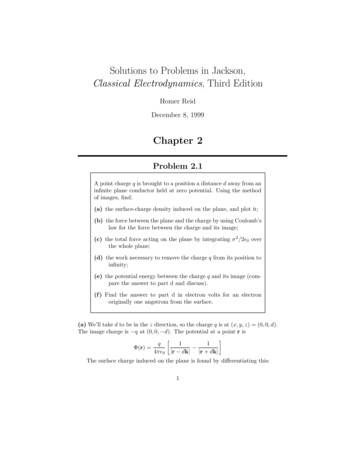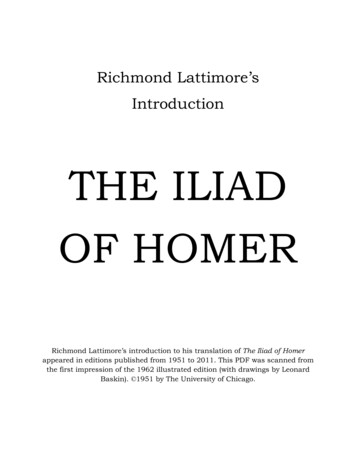
Transcription
Richmond Lattimore’sIntroductionTHE ILIADOF HOMERRichmond Lattimore’s introduction to his translation of The Iliad of Homerappeared in editions published from 1951 to 2011. This PDF was scanned fromthe first impression of the 1962 illustrated edition (with drawings by LeonardBaskin). 1951 by The University of Chicago.
INTRODUCTIONItried in this introduction to put before the reader the information that will help him to a more complete understanding of thetranslation. 'Information', though, if it concerns Homer, means controversy; so I have had to cut a rather sweeping path through a mass ofdifficult or insoluble problems, working trom the text and not trom theliterature on the subject. The exposition will of course not have the authority ofa properly documented monograph. Some ofmy interpretationsI should like, in some more appropriate place, to elaborate and defend.Still, all this aside, the introduction represents the translator's ideas aboutthe Iliad.Even a select bibliography is, accordingly, not called for here, but Imay mention a few works, some ofwhich I have referred to briefly in thefollowing pages, which will be particularly helpful to the general student:HAVET. W. ALLEN: Homer: Origins and Transmissions, Oxford, ClarendonPress, 1924.S. E. BASSETT: The Poetry ofHomer, Berkeley, University of CaliforniaPress, 1938.C. M. BOWRA: Tradition and Design in the Iliad, Oxford, ClarendonPress, 1930.From Virgil to Milton, London, Macmillan, 1945.RHYS CARPENTER: Folk Tale, Fiction, and Saga in the Homeric Epics,Berkeley and Los Angeles, University of California Press, 1946.E. DRERUP: Homerische Poetik: Das Homerproblem in der Gegenwart,Wurzburg, 1921. (This is the authoritative account of Homerictheory and controversy up to the time of its publication.)[11 ]
IntroductionH. G. EVELYN-WHITE: Hesiod, the Homeric Hymns, and Homerica, London and Cambridge, Mass., Heinemann and Harvard UniversityPress, revised edition 1936. (The Loeb edition of Hesiod and thefragments of the Epic Cycle, Greek text with English translation.)GILBERT MURRAY: The Rise of the Greek Epic, Oxford University Pressand London, Humphrey Milford, fourth edition 1934.J. A. SeOTI: The Unity of Homer, Berkeley, University of CaliforniaPress, 192I.A. SHEWAN: Homeric Essays, Oxford, Blackwell, 1935.THE STORY OF THE FALL OF TROYThe Greeks of the post-Homeric period, the 'classical' Greeks and theirsuccessors, that is, those Greeks who were literate and have left articulaterecords of their beliefs, considered that one of the episodes in the earlyhistory of their own race was the Trojan War. As to the details of thiswar, as to the interpretation of its causes and its meaning, there might bedisagreement; but for most persons at least, it was a piece of history, nota piece oflegend or myth; and the main characters and the essential courseof events were matters of general agreement.This essential story may be summarized as follows: Paris, also calledAlexandros, was the son of Priam, who was King of Troy, a city in thenorth-west corner of Asia Minor. Paris on an overseas voyage was entertained by Menelaos in Sparta, and from there carried away, with her fullconsent, Helen, the wife ofMenelaos. He took her back with him to Troy,where she lived with him as his wife. The princes of Greece thereuponraised a force of a thousand or more ships, manned by fighters, with aview to forcing the return ofHelen. The armada was led by Agamemnon,elder brother of Menelaos, the King of Mykenai; it included many lordsor kings from the Peloponnese, Central Greece, Thessaly, and certainislands, and each prince personally led his own following. The fleetassembled at Aulis in Boiotia and made for Troy. There the Greekslanded after a fight, but were unable to take the city. For nine yearsthey remained before Troy, keeping the Trojans on the defensive, andstorming and plundering various places in the vicinity. In the tenth year,Agamemnon, the most powerful chief, quarrelled with Achilleus, his most
Introductionpowerful flghting man. Achilleus withdrew from the fighting, and kepthis followers idle as well. In his absence, the Trojans, led by Hektor (a sonof Priam and brother ofParis), temporarily got the better of their enemiesand threatened to destroy the ships. Achilleus returned to the flghting,killed Hektor and routed the Trojans. Achilleus himself fell soon afterwards, but his death did not save Troy, which was presently taken. Mostof the defenders were killed, the non-combatant population was carriedinto slavery, and the kingdom of Troy was obliterated. The lords ofGreece made their way back, beset by weather, quarrels, and the hostilityof those they had left at home years before. The destruction of Troy wasbrought about by the design and will of the gods.Such is the basic story ofTroy: and I call it 'basic' because, while furtherdetails or episodes may have found universal acceptance later, all Greekwriters so far as we know accepted at least so much.THE HOMERIC POEMSThe story outlined above derives its authority from the fact that everything in it is contained in the Iliad or the Odyssey of Homer. The Greeksregarded Homer as their first, and greatest, poet. They might speak ofother names which pretended to greater antiquity, but they had no textto quote. For Homer they did. The Iliad and the Odyssey were unequivocally ascribed to him; other epics more doubtfully, as, for instance, 'theSack of Troy, by Homer or Arktinos'.I For the Iliad and Odyssey, full andreasonably sound texts were available from at least the end of the sixthcentury B.C.; possibly, and I would say probably, from long before that!Side by side with the transcription and dissemination of written textswent dissemination through recital, the business of professional recitersand interpreters of Homer, called rhapsodes.At any rate, Homer, for the Greeks, stood at the head of their literarytradition. All knew him, few challenged his greatness. Hesiod, alone of theITo be discussed a little later.2 There is considerable late evidence for some sort of editorial work performed atAthens in the time ofPeisistratos, who was tyrant from 560 to 528 B.C. The traditionis, however, confused, and the pieces of evidence frequently contradict each other.For a statement of the evidence see Allen, pp. 225-48. It is quite possible that the textwas edited at Athens in the time of Peisistratos; that this text was the original transcription seems to me very unlikely.
Introductionpoets who have survived in more than name, was sometimes thought ofas his contemporary and his equal; but Hesiod was far less widely quoted.Of the two great Homeric epics, the Iliad deals with the story ofTroy,the Odyssey with the homecoming of the Greek heroes after the captureof the city: in particular, the homecoming of Odysseus, the adventures,temptations, and dangers he went through before he made his way backto Ithaka and restored order in his own house. It thus concerns itself withheroic material chronologically later than that of the Iliad; and it hasusually, in antiquity as in modern times, been thought of as the later ofthe two compositions.THE STORY IN THE ILIADThe Iliad is a poem of 15,693 lines, written in dactylic hexameter. It hasbeen divided, as has the Odyssey, into twenty-four books, which range inlength from 424 to 909 lines. This division was made long after, not onlythe fIrst written version of the Iliad, but long after the time of Plato, perhaps early in the third century B.C. But the division was made well, theterminations mark clear and crucial points in the narrative, and the booknumbers are regularly used in modern editions of the text.The contents of the Iliad are as follows. Chryses, priest of Apollo inChryse, a small place near Troy, comes to the camp of the Greeks to askfor the return of his daughter, Chryseis, who has been captured andallotted to Agamemnon as his concubine. Agamemnon refuses, andChryses prays to Apollo to avenge him. Apollo inflicts a plague upon theGreeks. When there is no end in sight and the people are dying, Achilleuscalls an assembly of the chiefs to consider what can be done. With thesupport and encouragement of Achilleus, Kalchas the soothsayer explainsthe wrath of Apollo. Agamemnon, though angry, agrees to give the girlback and propitiate the god, but demands that some other leader give uphis mistress to him, in place of Chryseis. When Achilleus opposes thisdemand, Agamemnon takes away Briseis, the concubine of Achilleus.Achilleus does two things. He withdraws himselfand all his men fi-om thefIghting; and he prays to his mother, Thetis, a divinity of the sea, that shewill use her influence with Zeus and the Olympians to see that the Achaians are defeated in his absence, so that they may learn how necessary he hasbeen to their fortunes, and so that Agamemnon in particular must realize
Introductionwhat a man he has dishonoured. Thetis communicates her son's prayer toZeus, who reluctantly promises to carry out the wish of Achilleus.Such is the situation at the end of the first book, and from the quarrelhere set forth the rest of the action is generated. In the second book,Agamemnon's army, with Achilleus missing, is after some delays andconfusion marshalled and set in motion against the Trojans. A day offighting on which fortunes vary opens with an indecisive duel betweenMenelaos and Paris in Book 3 and closes with an indecisive duel betweenAias and Hektor in Book 7. But the Greeks are sufficiently shaken to takeadvantage, during a truce, of the opportunity to build a wall, which willdefend their camp and their ships.On the next day of fighting, the Trojans with the assistance of Zeusgain the upper hand, and by the end of the day (end of Book 8) they areencamped on the plain, confident that next day they can storm the defences of their enemies and sweep them into the sea. Agamemnon andhis chief men are correspondingly discouraged and fearful. Before hisassembled council, Agamemnon acknowledges his own fault in the quarrelwith Achilleus. He proposes to give back Briseis, whom he swears he hasnever touched, and to offer many other gifts and honours as well, ifAchilleus will come back. Odysseus, Aias, and Phoinix convey this message to Achilleus, who greets them and entertains them as friends, but isstill too angry to accept. The account of these dealings takes up the ninthbook. The tenth is devoted to a scouting expedition undertaken byOdysseus and Diomedes, which is represented as taking place on thesame night as the embassy to Achilleus.Book I I opens a great and eventful day of fighting, which does not enduntil Book 18. The Achaians begin well, but one after another the greatchampions are disabled (Agamemnon, Diomedes, Odysseus, as well asEurypylos and Machaon) until Aias is the only Greek of the first rankleft in the field. The Trojans drive the Achaians back and Hektor smashesin the gate of the wall, and leads the attack until the Achaians are fightingto save their ships from destruction. Hektor calls for fire, and sets oneship ablaze, but now a new turn occurs and the Greeks are unexpectedlyrescued. Achilleus, while still keeping out of the fight, has been watchingit, and his dearest friend, Patroklos, has become increasingly distressedand alarmed for the sake of the whole army. He persuades Achilleus tolend him his armour and his men and let him go into battle to save theships (beginning of Book 16).
IntroductionPatroklos is tresh and eager, and wears the superior armour ofAchilleus.His Myrmidons are rested and spoiling for a fight. But the Trojans havefought all day and are battle-weary, nor are they sure that the newcomer isnot Achilleus himself (p. 337). They break, and are swept back on theircity wall. Patroklos performs enormous exploits until at last, taken at adisadvantage, he is killed by Hektor. The fighting turns in favour of theTrojans once more. Hektor captures the armour of Achilleus trom thecorpse ofPatroklos, but the Achaians rescue the body itself That is all theycan do; by the end of Book 17 they are in full retreat.But by now Achilleus has heard the news. Shocked and furious as he is,he cannot go at once into battle, for he has no armour. But the godstransfigure him, and by merely showing himself and shouting his war cryhe turns back the Trojans, and the Achaians escape. The day's fighting isover. Hephaistos, at the asking of Thetis, forges new, iI!lmortal armourfor Achilleus. Next day Achilleus calls an assembly of the Achaians anddeclares the end of his quarrel with Agamemnon and his return to battle.The armies encounter. Achilleus leads the attack, slaughters many, and atlast drives the main body of the Trojans inside their walls. Hektor refusesto take refuge and awaits Achilleus. At the last moment, his nerve failsand he runs, with Achilleus in pursuit. The gods agree that Hektor mustnot escape, and Athene tricks him into standing his ground. Hektor goesdown fighting, is stripped and dragged by the heels trom Achilleus' chariot to the ships.Such is the position at the end of Book 22. The fighting of the Iliad isover, but the two great dead men, Patroklos and Hektor, still lie unburied.Patroklos is burned and buried with much ceremony and sacrifice, andelaborate games are held in his honour. These events occupy Book 23.Meanwhile, Hektor's corpse has been shamefully treated, but the godsdefend it trom harm. Priam, guided by Hermes, goes to the shelter ofAchilleus at night to ask for the return of his son's body. Achilleus pitiesthe old man, and gives it back; and the Iliad ends with the burial ofHektor by the Trojans.THE ILIAD AND THE STORY OF TROYIf we now measure the story of the Iliad against the entire story of theFall of Troy, as it was outlined above, we can at once see important
Introductiondifferences. The Iliad is not the story of Troy. Neither the beginning northe end of the war is narrated in the Iliad. We begin in the tenth year ofthe siege (p. 79) and we end, some weeks later, still in the tenth year,with the city still untaken. Moreover, the main plot of he Iliad is something narrower than would be the chronicle of a piece out of the siegetime. It is the story of Achilleus; or more precisely, it is, as has beenfrequently seen, the tragedy of Achilleus, which develops through hisquarrel with Agamemnon and withdrawal from battle, the sufferings ofthe Greeks in his absence, the death of Patroklos who tried to rescue theGreeks from the plight into which Achilleus had put them, and the vengeance taken by Achilleus on Hektor, who killed Patroklos. This is notchronicle but tragedy, with beginning, middle, and end. It is the story ofa great man who through a fault in an otherwise noble character (andeven the fault is noble) brings disaster upon himself, since the death ofPatroklos is the work of free choice on the part of Achilleus, and theanger of Achilleus, turned first against Agamemnon, then against Hektor,is at last resolved in a grudging forgiveness when the body ofHektor isgiven back to the Trojans. This, not the fall of Troy, closes the story. Infact, Achilleus did not, in the Iliad or anywhere else, take Troy; he diedfirst, but his death is not told in the Iliad, though it is foreseen. Thefighting during the absence of Achilleus is not ordinary fIghting such aswe are to understand took place continually during the ten years' siege,but an extraordinary counter-attack by the Trojans which could be madeonly in the absence of Achilleus. 2So the Iliad is the story of Achilleus. But it cannot be completely tornloose from the story of Troy, or of Achaians and Trojans. There is muchin the Iliad that has nothing to do with Achilleus. Furthermore, his personal actions have effects which go beyond his own story or his own aims.In avenging Patroklos, he saves the Greeks. In killing Hektor, he doomsTroy.Further: granted that the Iliad does not tell the story ofTroy, there musthave been some previous account, or more than one such account, thatdid. The Iliad is a work of art evolved within the scope of a chronicle; itis not the chronicle itselfIIPp. 377, 444, and elsewhere.2This is made plain by Homer, Iliad, p. 207. See also the speech ofPoulydamas,P·3 82 .
IntroductionTHE RELATIVE DATE OF HOMERThis can be seen most clearly if we consider the chronological relationbetween Homer and his material, i.e. the Trojan War. Greek historianswere at their weakest when it came to chronology, yet the tradition seemsgood enough for our purposes. A group of dates is given by Greekauthors for the fall ofTroy, and the dates range Tom 1334 B.C. to II50 B.C.The most noteworthy are Eratosthenes' II84 B.C., which has prevailedas the 'traditional date'; and Herodotus' (2. 145) approximate date of1250 B.C. All these dates are approximations based on genealogicalmaterial. We do not know which date is right, if anyone is. We do not,for that matter, know whether there was a Trojan War.! But we can seewhere tradition put it. When we consider the evidence for Homer's date,we fmd a more drastic set of variations. Some thought him a contemporary of the events he chronicled, others made him active sixty, or ahundred, or more, years later. Herodotus (2. 53) put him '400 years beforemy own time, at the most', that is, about 850 B.C!This Herodotean date may thus appear to be 'minimal', that is, thelatest we can accept. Actually, it is more likely to be maximal. Homercould not have lived at, or very near, the time of the events he tells about.For one thing, he himself makes it quite plain that what he speaks ofhappened long ago, when men were different Tom the men of his ownage, and could lift easily weights no two men now could lift (p. 270 andelsewhere). Such, too, is the drift ofhis appeal to the remembering Muses,who must bring to life what must otherwise be a rumour confused in time(p. 89). But further: between the time of Homer's story and the time ofHomer, Greek legend, which must, however confusedly, perpetuate historical fact, has placed two great events: the Dorian invasion and theIonian colonization. The Trojan War came before these; Homer cameafter.According to the tradition, upheavals and mass rival migrations followed the Trojan War. New tribes pushed into Greece, driving out oroverwhelming old ones. A race of invaders called Thessalians occupiedThessaly, and dislodged the Boiotians; these in turn occupied the territoryof the Kadmeians, thereafter called Boiotia. Dorians, in conjunction withI But something happened which gave rise to the legend, however remote thelegend may be from historical fact.2See Allen, II-4I, with data on the life of Homer tabulated, p. 32.
Introductionthe Herakleidai (the 'sons of Herakles'), came from the north to winSparta, Messenia, Argos, and other places in the Peloponnese. Whetherthese movements were sudden or gradual we do not always know. Thereis much evidence that the newcomers sometimes established themselvesby way of peacefUl compromise rather than outright conquest. Butestablish themselves they did. The result was a fUrther series of dislocationsand migrations, of which the most significant for our purposes was theoccupation of the coast ofAsia Minor and the adjacent islands by Hellenes.The most important of these Hellenic groups were called lonians andAiolians. They came from Thessaly, Boiotia, and the Peloponnese, thoseareas where the invasions had taken place.We do not know where Homer was born any more than we knowwhen he was born. We do not know whether he was an Ionian or anAiolian; Chios and Smyrna, where the two strains are hardest to separate,have the strongest claims on him. But of one thing we can, I think, besure. He was born on or near the coast of Asia Minor. Homer, therefore,comes after the Ionian migration; the Ionian migration comes after theDorian invasion; and the Dorian invasion comes after the Trojan War.Regardless of dates, the relative sequence is secure.But the Iliad is pre-Dorian. Homer, himself an Asiatic Greek, dealswith an age when there were no Greeks in Asia. The people of what inhis day were Ionia and Aiolia fight in the Iliad on the side ofTroy. Miletosis in the hands of 'the Karians of the outland speech' (p. 99). Homer doesnot call the men of Greece Greeks (Graikoi) as we do, nor again Hellenes,as they called themselves.' He calls them Achaians, Argives, and Danaans.His Argives are not necessarily from what was later Argos, nor are hisAchaians necessarily from what was later Achaia; they, like the Danaans,are just 'Greeks'. He avoids the term 'Dorians', which appears once in theOdyssey (19. 177); and he avoids 'Thessalians'. The term Hellene is closelyassociated with the term Dorian. Its opposites, Pelasgian, Karian, andbarbarian, he knows also, but regularly avoids them.The conclusion is, I think, quite clear. Homer knew-how could hehelp it?-that the Dorians and the others had come and driven his peopleI He does use, sparingly, the terms Hellas, Hellenes, Panhellenes. These terms seem,with the exception of one phrase found in the Odyssey, to be used of a particularlocality, Achilleus' country, Phthia in Thessaly, rather than of all Greece. Anachronisms and mistakes are possible, though, here as elsewhere.
I ntroduetionacross the water to Asia. But he ignored this, because he went back to anage generations before, when the ancestors of his audience, doubtless hisown ancestors as well, were lords of Greece and went to Asia not asfugitives to colonize but as raiders to harry and destroy. He betrays himself now and again through anachronisms, but he is trying to reconstructthe remote past.We have not, it is true, emerged from these considerations with apositive date for Homer. All we have is relative, attached to the date ofthe Trojan War, a date which itself cannot be fixed. We have, though,established that a considerable stretch of time elapsed between the dateof Homer and the period he chose to describe. And I hope that we thusdispose of any proposal to put him back in the immediate neighbourhoodof the Trojan War. Herodotus' 850 B.C. is certainly in better case than itfirst appeared to be, and it may be that we can find some help at the otherend, counting not forward to Homer but back to Homer. But first, weshould go back to the problem that led us into this chronological consideration, that is, the problem of Homer's relation to his material.THE RELATION OF HOMER TO HIS MATERIALAt the near end, we have the finished product, our Iliad. What do wehave at the far end? Plainly, the historical counterpart of the fictitiousTrojan War. This war may not have been much like what we hear about;it may not have been a ten years' war, it may not have been pan-Achaianin scale, it may not have been waged against Troy, and it may have beena defeat, not a victory. Personally, I think it was a viking-raid, or severalsuch combined into one. But it was something which, justifiably or not,generated the story of Troy we know. From the event, the legend, andtrom the legend, Homer; but between the event and Homer, we see now,the legend had time to grow.In what way? It is a question seriously debated whether Homer, comparatively late in the tradition, could write. Certainly, his most remotepredecessors could not. If we look at the text of the Iliad, we find illustrations of the way a legend could begin. Phoinix, in order to point hismoral, relates to Achilleus a piece ofrecent history, the story ofMeleagros(pp. 212-14). Nestor, with a blandness that becomes almost unendurable,recites again and again the heroic exploits ofhimself when young. Glaukos[20 ]
Introductionhas the history of his ancestor, Bellerophontes, all in his mind, and isready to pass it on to Diomedes as they pause and converse in the middle ofa great battle (pp. 157-58). Or again: when the peacemakers come to theshelter of Achilleus, they find him singing of the famous exploits of men,and accompanying himself on a lyre (p. 203).'The last case is noteworthy, because Achilleus is singing. Nestor andthe others tell their tales, of course, in Homer's hexameters, but are notmaking poetry. Simultaneously after the event, the tradition begins inprose saga and in verse. Neither kind of record is written down; bothkinds are communicated and perpetuated by word of mouth.Imagine this process repeating itself through the generations that stringout between the event and Homer, and you have some idea of what hismaterial was. Note that tales change in the telling, so that what reachedHomer may have been very different from what really happened, throughthe fault of no particular individual. Note again that among the mixedlot of story-tellers and poets there would probably be some more talentedand more influential than the general ruck. This would mean that certainaspects of the story would be emphasized, and prejudices might count.There is opportunity for selection within limits.And selection within limits was the privilege of Homer, too, when heset out to compose, within the story of Troy, the story of Achilleus.Within limits; the tradition must by now have fixed certain events in thestory in all the authority of fact. So Homer could not make Achilleus takeTroy any more than he could make Troy win the battle and survive. Hecould not save Achilleus, and he could not kill Odysseus. We have, therefore, the presumption of what we may call a basic story, which Homerknew, and which at the same time stimulated and limited his invention.He could emphasize or develop some parts, episodes, characters in thestory, barely acknowledge others, omit others entirely. But he could notcontradict the legends.For although Homer has selected a series of events occupying a fewweeks in the tenth year ofthe war, and does not deal with either beginningI There is something comparable in the picture of Helen working into the designshe weaves 'numerous struggles of Trojans, breakers of horses, and bronze-armouredAcbaians' (p. !O3): tbe history that is being made at tbe moment outside the citywalls. And this in turn reminds us of the up-to-date Tyrian settlers who have got thestory of Troy on their temple wall by the time Aeneas arrives to look at it (Ael1eid, 1.453-93). See Drerup, 75.
Introductionor end, he knows the beginning and the end. The Achaians came for thesake of Menelaos, to win back Helen whom Paris had carried off That isunderstood, and alluded to quite often. And he knows, and all the characters in his story pretty well know, that Troy will fall. At the same time,these parts of the story are not brought into the poem in any forthrightway, as something that must be explained to an audience. The flight ofHelen is alluded to in various contexts, and rather casually. She is firstmentioned in Hera's speech to Athene, when the Achaians seem to bedemoralized and on the point of going home (p. 80):As things are, the Argives will take.flight homeward overthe wide ridges of the sea to the land of their fathers,and thus they would leave to Priam and to the Trojans Helenof Argos, to glory over,jor whose sake many Achaianslost their lives in Troy far from their own native country.No fUrther explanation. So the audience knew who Helen was, what shedid. We have struck material in what I have called the basic story. Andhere is the first introduction of Hektor. It occurs in Achilleus' threat toAgamemnon (p. 65):Then stricken at heart though you be, you will be ableto do nothing, when in their numbers before man-slaughtering Hektorthey drop and die.One could, I suppose, gather from this that Hektor was a formidableTrojan; but scarcely more. And Patroklos? He first appears simply asMenoitiades, that is, the son of Menoitiosf I Hektor and Patroklos, so introduced, can hardly have been inventions of Homer. They came down tohim in the tradition, and his audience knew who they were. And so, oncemore, we strike the basic story which tradition handed on to Homer.Of such major fixed characters, Helen, who is far more important inthe story ofTroy than Patroklos, and even Achilleus, is far less importantin the Iliad. This emphasizes the selection within limits, and leads us toconsider the use or discard of usable material.I P. 67. In my translation I have here called him 'Patroklos. the son of Menoitios'so as not to be puzzling. But 'Patroklos' is not in the Greek until thirty lines later.Such introductions (or non-introductions) seem to me to be decisive against theviews that either Hektor or Patroklos was a fictitious character invented by Homer.[22]
IntroductionThe stories told by Glaukos, Phoinix, Nestor, which we referred toabove, are pieces out of the whole complex oflegend in which the storyof Troy itself is only one big episode. They are unassimilated lumps ofsaga, from near the story but not of it. They relate to the heroes of theIliad and can be brought in, at discretion: marginal material. But whilethese tales of Meleagros and Bellerophontes are not part of the story ofTroy, there is more material, marginal to the Iliad, which is part of thestory of Troy, and this material concerns our problem very nearly.MARGINAL MATERIALWe must consider certain episodes which form part of the ultimatestory of Troy, concerning which we get little or no information i.1l theIliad. One such episode, the flight of Helen , we have already noticed, andwe have seen that Homer knew it and accepted it, but made relatively littleof Helen because she is not important in that part ofTroy's story which isthe Iliad. If, however, we start from the story as it has come down to us,we may state the following propositions and try to verify them in Homer:(a) The ultimate cause of the Trojan War was the judgment of Paris.(b) The Achaian heroes were suitors for the hand ofHelen. Her father,Tyndareus, made them swear to stand by her husband, whichever of themit might be, in case someone should carry her off(c) The Achaian fleet was weatherbound at Aulis because of the angerof Artemis. Agamemnon sacrificed his da
Richmond Lattimore’s Introduction THE ILIAD OF HOMER Richmond Lattimore’s introduction to his translation of The Iliad of Homer appeared in editions published from 1951 to 2011. This PDF was scanned from the first impression of the 1962 illustrated edition (with drawing
